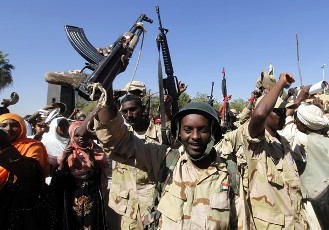Sudan vows ‘decisive showdown’ with rebels
May 7, 2013 (KHARTOUM) – Sudan’s presidential assistant and National Congress Party (NCP) deputy-chairman for the party’s affairs, Nafie Ali Nafie, has threatened to mount a decisive battle against rebel groups which have stepped up their military activities in recent months.

In a rare attack last month, SRF rebels swept through the city of Um Rawaba in North Kordofan, before withdrawing later in the day.
Fighting between the rebels and the Sudanese army (SAF) has previously been mainly limited to Darfur, South Kordofan and Blue Nile states bordering South Sudan, which seceded from Sudan in 2011.
North Kordofan, the region that includes Um Rawaba and forms part of Sudan’s commercial heartland, is a hub for the country’s agriculture, livestock and gum Arabic industries.
Diplomats and analysts speaking to Reuters said the raid on North Kordofan’s second largest city appeared to be a bid to stretch Sudan’s army across an ever-changing line of battle in Sudan’s savannahs and scrublands, rather than an attempted land grab.
The Sudanese army now has it eyes on reclaiming Abu-Kershola district in South Kordofan which was overran by rebels during last month’s assault.
Officials in Khartoum say that they have completely surrounded the area and pledged not to stop until they recapture Kauda which is the stronghold of the rebel Sudan People’s Liberation Movement-North (SPLM-N) in South Kordofan.
Nafie declared that the government has enough information on rebel groups active in the volatile region, including their objectives and military entry points in Kordofan and Darfur.
The Sudanese official said that signs of rebel defeat have begun to show in North Kordofan, predicting that this would continue in South Kordofan until Sudan was cleansed of “traitors”.
He went on to say that thousands of “Mujahideen” (holy fighters) are on the move to rebel-held areas, accusing the SRF of targeting people from certain ethnicities in Abu Kershola district in order to instigate strife.
The presidential assistant urged residents not to fall into the rebels’ trap of ethnicity and tribalism.
Nafie said that the West’s animosity towards the Sudanese government is a strategic ploy, aimed at toppling the regime which he claims is leading an Islamic awakening.
He emphasised that the West would not reconcile with Sudan unless it is forced to “out of desperation”.
However, Nafie also pointed out that the stance of Western nations towards Sudan has begun to change, claiming that the United States has lost faith in its “agents” in the country, especially after the signing of cooperation agreements with South Sudan.
In a clear reference to an invitation extended to him by Washington which drew strong rebuke from rights groups, Nafie went on to say that the US is now opening its doors for dialogue with the Sudanese government
Last month, the US Chargé d’affaires, Joseph D. Stafford, said that Washington is committed to continuing dialogue with the Sudanese government in spite of the challenges facing the countries bilateral relationship.
There have been conflicting reports on Nafie’s upcoming visit, with local media suggesting it has been delayed.
Sudan has been on the US blacklist of states sponsoring terrorism since 1993 over allegations of harbouring Islamist militants despite credible reports of Sudan being a cooperative intelligence partner of Washington in the so called “war on terror”.
Sudan has also been subject to comprehensive economic sanctions since 1997 over terrorism charges, as well as human right abuses. Further sanctions, particularly on weapons, have been imposed since the 2003 outbreak of violence in the western Darfur region.
(ST)
